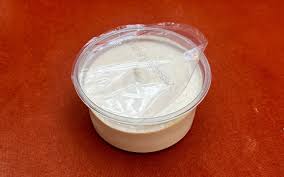
Tesco and Sainsbury’s have each swapped hard plastic lids on private-label hummus products for a thin film to cut back on plastic packaging.
Both supermarkets announced their respective decisions this month, with an estimated combined saving of more than 50 million pieces of plastic per year. The replacement lid is similar to those widely used to top many yogurts, creams, and some desserts.
While many customers have expressed their support for the sustainability measures, others criticized the use of non-recyclable, non-resealable film. Some have taken to using cling film to cover opened hummus pots, and others suggested the move will result in food waste.
Tesco and Sainsbury’s reminded customers that their hummus should be eaten within two days of opening, and said that the removal of rigid plastic lids does not reduce overall quality or shelf life. Both Tesco and Sainsbury’s also sell reusable silicone lids in several sizes.
“We have recently removed the lids on our hummus pots as part of our ongoing efforts to tackle plastic waste,” a Tesco spokesperson told the Guardian. “This latest change will remove more than 31m pieces of plastic – equivalent to 157 tonnes of plastic a year.”
Both Tesco and Sainsbury’s are signatories of 2018’s UK Plastics Pact, which brings together businesses “from across the entire plastics value chain” to tackle waste. Led by the Waste and Resources Action Programme (WRAP), the pact’s core 2025 targets include:
The elimination of unnecessary single-use packaging; For all packaging to be reusable, recyclable, or compostable; The effective recycling of 70 percent of plastic packaging; And a 30 percent average recycled content across all plastic packaging.
Tesco has said that its ongoing goal of reducing plastic to “an absolute minimum” has saved over 5,900 tonnes of packaging, thanks to measures such as its popular plastic-free “tattooed” avocados. Meanwhile, Sainsbury’s also made a 90 percent reduction in packaging across its baked goods section earlier this month, saving over 400 tonnes of plastic annually.





